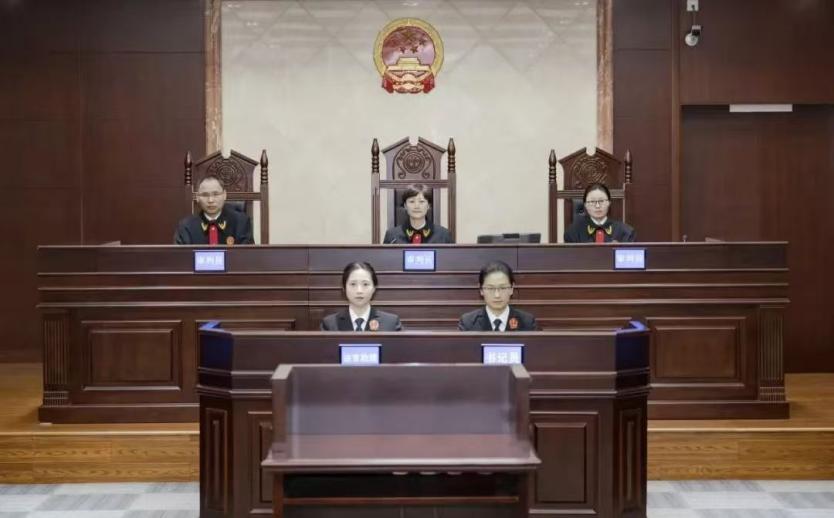How Chinese court resolves foreign-related maritime dispute

Photo shows the judicial team handling the case. (Photo from the official account of Ningbo Maritime Court on WeChat)
Two foreign-flagged vessels collided in the Strait of Malacca, a critical international maritime passage. With jurisdictional authority contested among five nations, the involved foreign shipping companies unanimously entrusted the case to the Ningbo Maritime Court in China, voluntarily selecting Chinese law to govern the dispute. What motivated this decision, and how was the case resolved? Let us examine the details.
On Sept. 27, 2022, near Batu Pahat, Malaysia, the Liberia-flagged container vessel GSL Grania (owned by the Marshall Islands-based Global Ship Lease) was en route to a Malaysian port at seven knots.
Without warning, the Panama-flagged oil tanker Zephyr I (operated by another Marshall Islands-registered firm) executed an abrupt turn toward the GSL Grania. Despite emergency maneuvers by the latter, a collision ensued, marked by a resounding impact in the early hours.
Both vessels sustained substantial damage. Post-collision, their cargoes were offloaded in Malaysia. The GSL Grania was later repaired in Singapore, while Zephyr I underwent repairs in Zhoushan, Zhejiang province, China.
To seek restitution, Global Ship Lease petitioned the Ningbo Maritime Court to detain Zephyr I during its repairs. The company subsequently filed a lawsuit claiming 58.1 million yuan ($8.03 million) in damages for hull repairs and operational losses. The opposing party countered with a 38.1 million yuan counterclaim at the same court.
The case presented substantial legal complexity beyond its financial implications, given its multinational dimensions. The Zephyr I was Panama-registered, while the GSL Grania flew the Liberian flag. The collision occurred in Malaysian territorial waters, with Malaysia also serving as the first post-incident port of call for both vessels. Both shipping companies were headquartered in the Marshall Islands, and China became jurisdictionally relevant as the location where the Zephyr I was detained.
"This dispute involved overlapping jurisdictional claims from five nations: Malaysia, the Marshall Islands, Panama, Liberia, and China," stated Du Qian, president of the Ningbo Maritime Court and presiding judge in the case. "Despite multiple options, the foreign companies mutually elected to pursue adjudication through the Ningbo Maritime Court."
Why did the parties prioritize a Chinese court when alternative jurisdictions were available? Tong Dengyong, legal counsel for Global Ship Lease, emphasized the court's operational efficiency as a decisive factor. "The swift processing of the vessel detention order—completed within half a day—demonstrated the court's procedural rigor and responsiveness," he noted, underscoring how this efficiency influenced their jurisdictional choice.
The Ningbo Maritime Court's established competence in resolving international maritime collision disputes further solidified its standing as a forum of choice. Its extensive expertise in such cases, coupled with its reputation for procedural rigor and operational efficiency, significantly influenced the litigants' jurisdictional preference.
"Both parties consistently affirmed their trust in China's legal framework and maritime adjudicatory processes throughout the proceedings," emphasized Judge Du. Notably, the companies formally petitioned the court to apply Chinese law as the governing legal regime for the dispute.
"The central contention pertained to collision liability attribution and subsequent damage allocation," clarified Judge Du. In the absence of an authoritative liability determination, the court prioritized dispute minimization by mediating structured negotiations between the parties.
The disputing parties ultimately commissioned the maritime identification and investigation center at Dalian Maritime University to conduct a technical appraisal of the accident and establish proportional liability.
The forensic evaluation determined a 1:9 liability ratio between the two shipping entities. The court ratified these findings, adjudicating that the collision primarily stemmed from the Zephyr I crew's operational errors, including miscalculating overtaking distances, inadequate familiarity with helm systems, and improper emergency navigation. Concurrently, GSL Grania was deemed partially liable for failing to maintain adequate situational awareness and promptly recognize the Zephyr I's loss of navigational control to initiate evasive measures. Final liability was apportioned at 90% to Zephyr I and 10% to GSL Grania.
"Initial objections to the judgment were raised by the defendant," Du stated. To ensure procedural fairness, the court facilitated multiple in-person consultations between legal representatives, systematically addressing concerns through comparative analysis of China's Maritime Code and the 1972 International Collision Regulations (COLREGs). Technical assessors were further summoned to provide evidentiary clarification under oath, substantiating the appraisal's validity. This deliberative approach culminated in mutual acceptance of the verdict.
Given the intricate nature of vessel repair protocols and the voluminous documentation of component costs, both parties submitted itemized claims comprising thousands of line items. The tribunal conducted rigorous scrutiny of each entry, mandating supplementary evidentiary support or adjustments for inconsistencies. This exhaustive audit yielded judicially validated compensation figures for both claimants.
On June 26, 2024, Global Ship Lease received damages totaling 34 million yuan, inclusive of interest, thereby conclusively resolving the dispute.
"Judicial officers maintained consistent engagement throughout the litigation process, conducting over thirty consultations—via teleconference and in chambers—to exhaustively examine jurisdictional, factual, and evidentiary considerations," remarked Xu Quanzhong, legal counsel for the defendant.
Xu emphasized that the presiding judge's rigorous adherence to international maritime legal standards exemplified China's judicial integrity and growing influence in global maritime governance, underscoring the nation's commitment to a rules-based maritime order.
Photos
Related Stories
- Countermeasures against foreign sanctions empowered
- China unveils regulation on implementing anti-foreign sanctions law
- China's securities regulator to advance rule of law in capital markets
- Judicial efforts ensure public well-being
- Proposed laws on ethnic unity, economy praised
- More judicial efforts aim to protect rights of businesses
- China enhances publicity, enforcement of law on cultural relics protection
- China's State Council completes handling of proposals, suggestions from national lawmakers, political advisors in 2024
- China's draft law prohibits arbitrary fines on private enterprises
- China mulls law revision to promote development of civil aviation
Copyright © 2025 People's Daily Online. All Rights Reserved.









